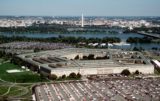
President Trump’s troika of generals may ease public fears about his irascible unpredictability, but they also are busy padding the U.S. military budget and fattening up friendly arms manufacturers, JP Sottile writes.
A favorite tactic of U.S. propaganda is to label a foreign adversary “crazy” to justify a military attack — as is now happening with North Korea’s Kim Jong Un although his nuclear program really makes logical sense, observes Ted Snider.
Exclusive: If the U.S. government and mainstream media are really concerned about foreign influence in American politics, they might look at Israel and other nations with much more clout than Russia, notes Robert Parry.
PBS’ “The Vietnam War” may show some of the conflict’s horrors but still soft-pedals the horrific war crimes that America inflicted on Vietnam, fitting with a corporate-dependent documentary project, writes John Pilger.
Exclusive: New tests support the skepticism of U.S. intelligence veterans that Russia “hacked” the DNC’s computers, pointing instead to a download of emails by an insider, write ex-NSA official William Binney and ex-CIA analyst Ray McGovern.
With President Trump demeaning North Korea’s leader as “Rocket Man” and threatening to “totally destroy” North Korea, tensions over Kim Jong Un’s nuclear missile program grow worse, as Dennis J Bernstein reports.